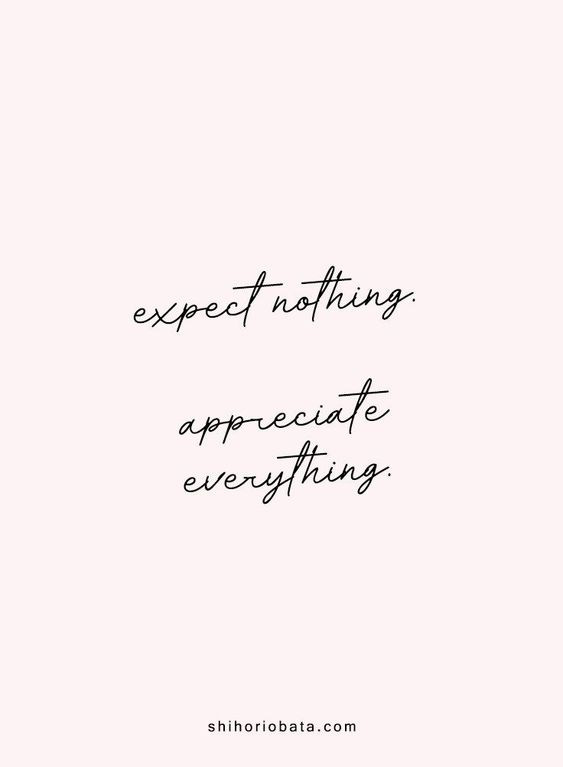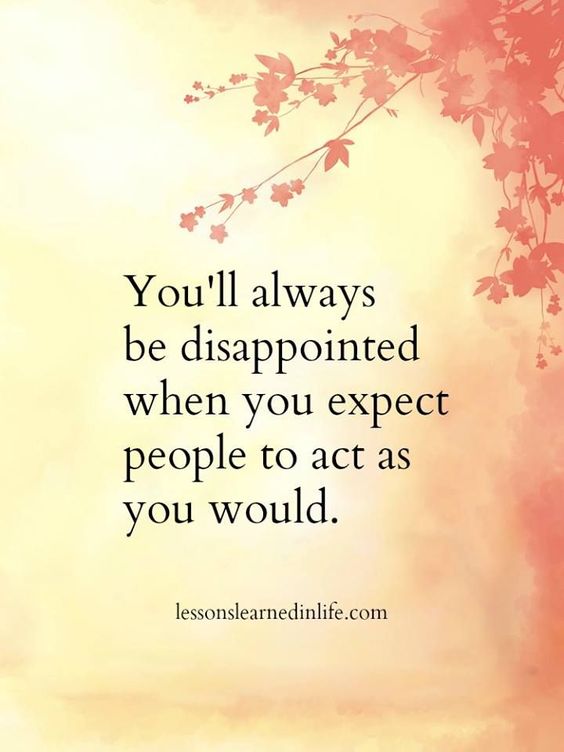Expectations will set you up for disappointment.
It’s important to remember and accept just how much is out of our control; and, to be open-minded, you have to allow for change and understand that every person is on their own journey (whether it’s moving or stagnant). Their journey does not have to mirror yours; neither do their values, mindset or understanding.
When we have expectations, we are attaching ourselves to an outcome in the future. When we are not present, as in solely in this very moment, we are also ascribing specific behaviors and trying to control the flow of life as it is unfolding. Having expectations differs from a vision or goal because expectations require us to mentally create the steps (of others) towards the outcome, and by doing so, we give away our power to external forces and rely on how we think things “should” go. That attachment removes us from reality and can create dissonance between what you want and what is being unveiled to you. You’re not always going to get what you want in the exact way that you want it… or expect it.

You may want a cake, and life will give you the flour, eggs, spices and icing; but, if you thought you were going to wish for the cake and get it baked, you might miss the blessing in the lesson. Or, you might go get you a cake and it’s not going to taste to your liking because you tried to outsmart the Universe and skip some steps just so you can get what you thought you wanted.
Not having expectations can actually set you up for increased happiness because once your desire does unfold, and you didn’t have a preconception about the how, when, why or physical manifestation of it, you will feel more gratitude and appreciation for it happening. Having patience, awareness and faith that the desire will occur is key to being in a spiritual and mental place of reception. Be grateful you got the ingredients!

If you cannot let go of your expectations, you will begin to attempt to force the external to be confined to your cravings – and that’s not helpful for you or anyone/anything else involved because it places limits on potential and free-will. You can have god-consciousness, but you can’t play God – you don’t have that much control, and by thinking you do, your intentions lose their purity; as in, they are not coming from a loving mindset, but a controlling one. Wanting to have control is a fear-based mentality, but that’s another conversation we’ll get to later.
Having expectations can look like:
- If I do a, b and c for someone, they will do/give me d, e, f; If I bend over backwards or go against my Self for this person, they will see my worth/love me/be there when I want them to, etc.
- If I change and conform/assimilate, I will be accepted in “x” environment or by “y” person.
- If this happened before, it means “z,” and “z” will always happen.
There are tons of ways we place expectations on, not only others, but ourselves. Expectations aren’t freedom.
What are you really desiring?
A sense of belonging? Reciprocated love and emotional fulfillment? Praise? Materialistic success? Attention? A feeling that somebody cares? Self-worth? The feeling that things happen for you and not to you? A sense of safety? A feeling of ease? None of that actually comes from having expectations, especially not from the world we find ourselves living in – with its overrepresentation and indications of greed, neglect and unhealed trauma.
In therapy, I never have an expectation that my clients will change – I can only present my best attention and knowledge, but that’s up to the individual what they are willing to do and the choices they make.
When I worked with college students, I quickly learned that I could not have an expectation that they knew how to write a paper or had knowledge of Self (no matter what race/ethnicity the individual claimed). They all came from different backgrounds, experiences/exposure and levels of support/resources.
I had a situation recently where I was told some information and someone responded, “I wanted you to be happy for me.” Yet, honestly, I was feeling indifferent towards this person and focused on myself, so I didn’t give the person the reaction that they wanted and I believe it caused tension.
There were times I expected my dad to provide emotional support or a safe environment for me, but that was rarely the reality of the situation; and it had nothing to do with me, but where he is/was at in his particular journey of healing so there could be more mutually positive interactions.
I had a job one time where I had an expectation that I’d have support and be able to grow and develop (in the way I intended); or I was told certain things and had an expectation how things were going to go, and someone came in and went against everything I had been set up to expect – I had no control of other people’s reactions or their own personal issues and how their “stuff” would impact their engagement with me, and I had to learn how to ride the wave of change.
How many times have you heard, “They should’ve known,” but who communicated it, if at all, and how? “They” should’ve – nothing. They did what they knew how, or decided to do.
I expected to have both of my parents around throughout my life, but my mother died rather unexpectedly when I was just shy of 19-years-old. I’ve had friends that, at a point in time, we’d say we’d be “friends forever,” or plan out our life and that hasn’t necessarily happened; and that is perfectly okay… because, once again, change.
You have a choice to either fight against what is happening, or surrender to the moment and the adjustments. Change is the only thing you can expect. There’s a lot to unpack in all of the tangible and vague examples I just presented, and I’ll delve into them more over time.

However, what I do encourage you to have is standards. Currently, I am defining standards as specific ideals, measurements and archetypes that articulate certain principles that are to be upheld. Having standards requires having actively enforced boundaries. Standards allow for the ebbs and flow of life, rather than having a fixed perception.
When I work with clients or students, we set those standards and my goal is to work collaboratively with you, hold you accountable and/or teach you how to have a high level of attainment of said ideals. I set a standard for having a commitment to unlearning toxic beliefs and behaviors and continuously striving to become the best, most authentic version of Self; a standard of not giving up.
Standards are a form of self-care and self-love.
Now, keep in mind, I’m not saying to look down on someone if they don’t reach your standards – they are simply that, your own. You can’t expect someone to want to reach your personal ideals, because they may not align. If you’re working within a community or in some type of relationship, those values should be collectively established. Either way, it necessitates clear communication and agreement between all parties. Remember to remain flexible because… yes, hopefully you’ve guessed it by now – things change.

Standards show that you know your worth and will not settle for unrequited love/support/encouragement, etc.; that you do not have to lower your morals to fit a narrative that you’ve created in your head or people attempt to place on you. Standards allow you to see what is real and remain grounded within your Self, knowing that you are already enough.
